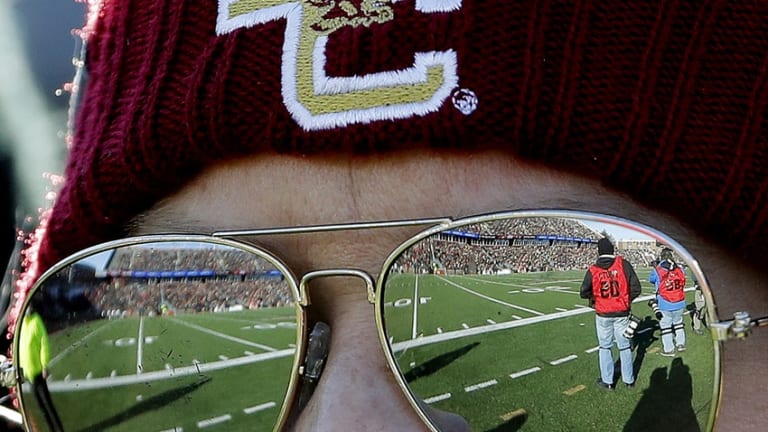
A Jersey Guy: Big 12 gets a taste of Big East deja vu
The headline turned heads: Big 12 commissioner Bob Bowlsby irritated by Oklahoma and Texas' intention to join the SEC accused ESPN of getting another conference to further "destabilize'' his conference.
ESPN quickly responded with a denial.
""I have absolute certainty that they (ESPN) have been involved in manipulating other conferences to go after our members, Bowlsby told the Associated Press.
Just another day in the ever increasing cut-throat business of big time college athletics.
That news item triggered a memory of the first major conference raid in 2003 when the Atlantic Coast Conference, wishing to improve its football profile and footprint, made plans to expand from 9 to 12 teams by using the then Big East football league as its prime target.
I was working at the Boston Globe at the time and Boston College was one of the schools targeted by the ACC.
Such moves are part of the business of major college football, where money always has been and always will be the main criteria.
What is not standard procedure was the way BC went about its business in eventually getting to the ACC.
The first part of the move was seamless. The ACC invited Miami and Virginia Tech, who officially joined on July 1, 2004.
This was particularly frustrating for BC and then athletic Gene DeFilippo, who had been part of the initial ACC expansion talks in the summer of 2000.
DeFilippo, who once told me that his dream job would be as commissioner of the Big East, had flipped his alliances and was fairly confident that BC would be part of the first expansion wave.
The original plan was to include Miami and BC as the first two teams, but that changed dramatically when Virginia used political pressure to include Virginia Tech as a member rather than BC.
BC was faced with a dilemma. They were not part of the ACC expansion (publicly), but the conference still only had 11 teams, one short of the 12 necessary to stage a lucrative conference championship game.
BC was the choice in waiting, but neither the ACC nor BC could say that.
The Big East, much like the Big 12, was in a stagger mode and made plans on how it would recover, creating a committee to examine options.
DeFilippo was included in that briefing and he talked about the Big East's options.
At the same time, BC was receiving assurances that it would be part of the next wave of ACC expansion, which would come quickly.
"If Boston College had left the first time, we would have been angry and hurt, but we would understand,'' a former administrator from a Big East school told me at the time. ""What irritates a lot of us is that they came back into the room and were making plans for the future in our league at the same time they were continuing talks with the ACC.''
By October of 2003, BC had dropped all pretense of any interest in the Big East, while the ACC announced that the Eagles would be the 12th member of the conference, beginning in July of 2005.
Oklahoma, Texas and the SEC made their plans public this week and the deal should be finalized sooner rather than later, with the consensus opinion being that the 16-school SEC will make its debut in September of 2022.
And while collusion between ESPN and another conference (most likely the American Athletic Conference) might be difficult to prove, there is no question that ESPN's finger prints are all over this matter.
It's always been that way.
Big East veterans are still laughing about a comment DeFilippo made to the Boston Globe in 2011 when he was chairman of (another) the ACC expansion committee.
"We always keep our television partners close to us,’’ he said. "You don’t get extra money for basketball. It’s 85 percent football money. TV - ESPN - is the one who told us what to do. This was football; it had nothing to do with basketball.’’
DeFilippo tried to back off of that comment and issued a public apology, which created another amusing feedback: making an apology for telling the truth.
Just what direction the Big 12 and AAC or anyone else goes with any new configuration remains to be seen, but the latest moves involving Texas, Oklahoma and the SEC was directly connected to television, which continues to have the loudest voice in any room in which college athletics is discussed.